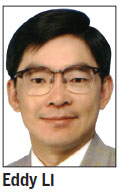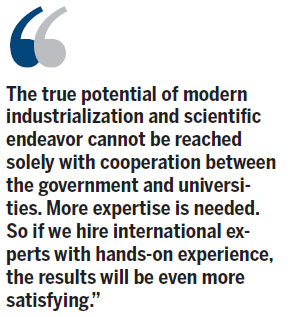Technological innovation needs overseas talent
Updated: 2014-05-23 05:09
By Eddy Li(HK Edition)
|
|||||||||
Recently, the government has been planning to combine the two subordinate departments of the Commerce and Economic Development Bureau - Innovation and Technology Commission and Office of the Government Chief Information Officer. This is to create a new Innovation and Technology Bureau to inject some extra dynamism into Hong Kong's economy.
In his manifesto in 2012, Chief Executive Leung Chun-ying proposed establishing an Innovation and Technology Bureau. After two years, and with some modifications, he again brought up the proposal. Today's world is all about science and technology - which to a certain extent decides an economy's cutting edge. As a businessman, I fully understand that Hong Kong's economic development is bound up with innovation and the popularization of technology. So I hope such a department can be successfully established soon.

Online shopping, for example, has considerable future potential which can be developed. On Nov 11 last year, the so-called "Single's day" - the busiest online shopping day of the year - added 30 billion yuan ($4.81 billion) to the total amount generated by online shopping on the mainland. Admittedly there are aspects of this which still need to be improved. But because of its convenience and competitive prices, online shopping is a very promising concept. In the future, the new bureau will need to strengthen supportive facilities to cope with this trend. This includes improving information network systems, facilitating the construction of 4G and 5G networks and optimizing infrastructure.
It is very likely the government still mainly depends on academic institutes to promote technological development. Hong Kong's colleges have undoubtedly made impressive contributions in this area. The most significant case is the "Father of Fiber Optics" Charles Kao (vice-chancellor of the Chinese University of Hong Kong from 1987 to 1996). Kao helped bring revolutionary and far-reaching changes to the Internet. Along with universities, I believe Hong Kong's industrial and commercial circles would also be willing to work with government projects. The SAR government can learn from successful experiences abroad and "borrow" talented people from foreign countries.
South Korea has successful experience doing this. In 1983, Korean engineering giant Samsung began work in the semiconductor field. It hired lots of experienced "Sunday engineers" from Japan on high salaries to help manage its technology. Many Japanese engineers flew to South Korea, worked for a day and flew back to Japan on Sunday. This was the origin of the term "Sunday engineers".

In addition to Japan, Samsung also recruited talented people from San Francisco in the United States. Their salaries were three to five times higher than those of Samsung's own managing directors. This strategy made a crucial contribution to the company's development. It offers a good example to Hong Kong.
A reason for establishing the Innovation and Technology Bureau is to boost Hong Kong's economic development. The true potential of modern industrialization and scientific endeavor cannot be reached solely with cooperation between the government and universities. More expertise is needed. So if we hire international experts with hands-on experience, the results will be even more satisfying. With European countries now experiencing an economic downturn, it is a good time to attract overseas talents to Hong Kong.
According to Chinese writer Lu Xun, no creation can be made without borrowing from existing things. This is also true for scientific innovation. We should learn from others when developing our own innovations. This will help industries move forward into the future.
The author is vice-president of the Chinese Manufacturers' Association of Hong Kong.
(HK Edition 05/23/2014 page9)